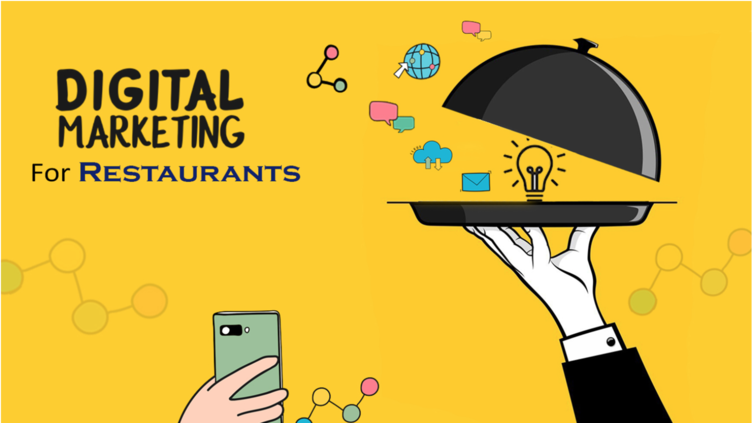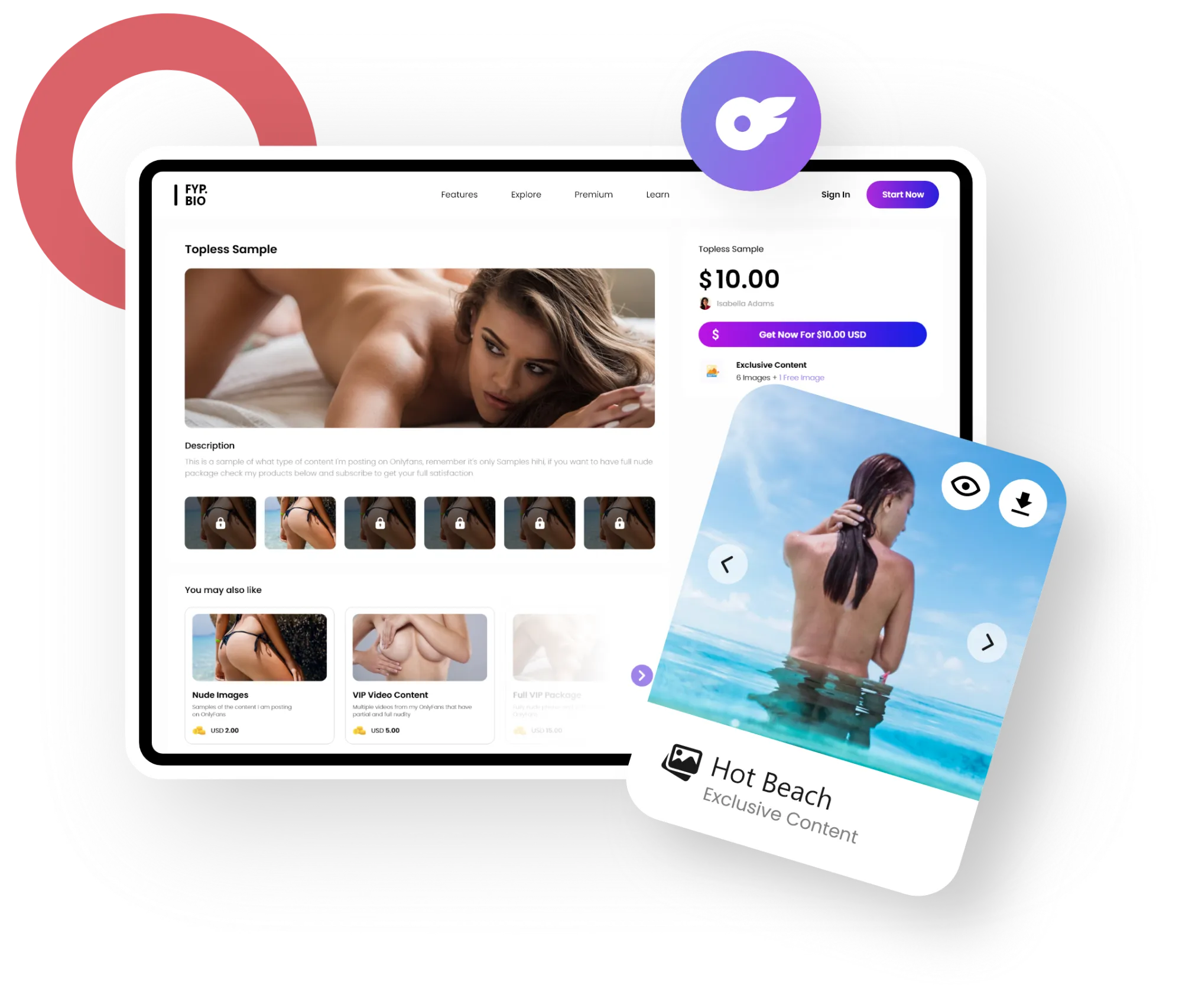Guide To Digital Marketing For Restaurants (2023)

In today's highly competitive restaurant industry, having a strong online presence is crucial for attracting customers and driving business growth. With the increasing number of people using the internet to search for dining options and make reservations, digital marketing has become a vital component of a restaurant's overall marketing strategy. In this comprehensive guide, we will explore various digital marketing techniques for restaurants, the importance of digital marketing, alternative marketing methods, and address frequently asked questions. We will also discuss the use of link in bio tools as an essential component of your digital marketing strategy.
Website Development and Optimization:

Your restaurant's website is the foundation of your digital marketing efforts. It should be visually appealing, easy to navigate, and mobile-friendly. Ensure that your website contains essential information such as your menu, location, contact details, and hours of operation. Optimize your website for search engines by incorporating relevant keywords and phrases, using proper meta tags, and creating high-quality content.
Search Engine Optimization (SEO):

SEO is crucial for improving your restaurant's online visibility and driving organic traffic to your website. Start by conducting keyword research to identify terms that your target audience is using to search for restaurants like yours. Optimize your website content, meta tags, and image alt tags with these keywords. Additionally, ensure that your website loads quickly, is mobile-friendly, and has a secure HTTPS connection.
Local SEO:

Local SEO focuses on improving your online visibility specifically for local search results. Claim and optimize your Google My Business listing by providing accurate and up-to-date information, uploading high-quality photos, and encouraging customers to leave reviews. Also, make sure your restaurant's name, address, and phone number (NAP) are consistent across all online directories and platforms.
Social Media Marketing:

Leverage popular social media platforms like Instagram, Facebook, and Twitter to engage with your audience, share content, and promote your restaurant. Post high-quality images and videos of your dishes, behind-the-scenes footage, and special events. Use relevant hashtags, engage with your followers through comments and messages, and share user-generated content. Remember to include a link in your bio using link in bio tools like FYP.bio, which can direct your audience to your website, menu, or online reservation system.
Email Marketing:

Build an email list by offering incentives like discounts or exclusive offers in exchange for your customers' email addresses. Use email marketing to send personalized messages, promotions, and updates to your subscribers. Segment your email list based on factors such as customer preferences and purchase history to send targeted messages that resonate with each group. Don't forget to include links to your website and social media profiles in your email signature or use link in bio tools like FYP.bio to aggregate all your important links.
Online Advertising:

Invest in pay-per-click (PPC) advertising on platforms like Google Ads and Facebook Ads to target potential customers who are actively searching for restaurants in your area. Set up geo-targeted campaigns and use relevant keywords to reach your target audience. Track the performance of your ads and optimize them to achieve better results.
Influencer Marketing:

Partner with local food bloggers, influencers, or micro-influencers to promote your restaurant to their audience. This can help you increase brand awareness, reach a larger audience, and drive more traffic to your website or social media profiles. Ensure that the influencers you work with have a genuine connection to your restaurant and a loyal following.
Online Reviews and Reputation Management:

Monitor online reviews and respond to both positive and negative feedback promptly and professionally. Encourage satisfied customers to leave reviews on platforms like Google, Yelp, and TripAdvisor. Negative reviews can harm your online reputation, so it's essential to address any issues and demonstrate that you value your customers' feedback. Implement improvements based on the feedback received and showcase these changes to your audience.
Content Marketing:

Create valuable content for your website and social media profiles that resonates with your target audience. Share blog posts about your restaurant's story, recipes, cooking tips, or industry trends. Create visually appealing infographics, videos, or podcasts to keep your audience engaged and showcase your expertise in the food industry. High-quality content can help improve your SEO, increase website traffic, and establish your brand as an authority in your niche.
Online Reservation System:

Integrate an online reservation system into your website to make it easy for customers to book a table at your restaurant. This can help streamline your booking process, reduce no-shows, and provide valuable insights into your customers' preferences and dining habits. Online reservation systems can also help improve your online presence and drive more traffic to your website.
Utilizing FYP.bio:

FYP.bio is an advanced link in bio tool that allows you to aggregate all of your links, including but not limited to social media profiles, products, websites, and everything else.
What is a Link In Bio Tool?
Link in bio tools are used to optimize the use of the "link in bio" feature on social media platforms, especially Instagram. These tools allow users to create a custom landing page with multiple clickable links that can be easily shared with their audience. This enables businesses, influencers, and content creators to drive traffic to multiple websites, products, or services from a single link in their Instagram bio.
FYP.bio is the easiest link in bio tool website. The unique monetization tools can turn your bio page into a storefront where your followers can purchase content, cameos, 1:1 calls, community access, and more.

FYP.bio is known by many creators as the place where visionaries build empires.
The best part is it’s completely free to use and publish with advanced customization features.
Why Digital Marketing Is Important:
Digital marketing is vital for many reasons, below are some of the main reasons why:
Increases brand awareness:

Digital marketing allows you to reach a wider audience and build brand awareness among potential customers. By leveraging various online channels, you can showcase your restaurant's unique offerings and create a strong brand identity.
Attracts new customers:

With the majority of people using the internet to search for dining options, having a strong online presence can help you attract new customers. Digital marketing techniques like SEO, PPC, and social media marketing can help you target potential customers who are actively searching for restaurants like yours.
Enhances customer engagement:

Digital marketing enables you to engage with your customers on a more personal level through social media, email marketing, and online reviews. By responding to their feedback and offering personalized promotions, you can foster long-lasting relationships with your customers and encourage repeat business.
Provides measurable results:

Digital marketing allows you to track and measure the success of your campaigns using various analytics tools. By analyzing data like website traffic, social media engagement, and ad performance, you can make informed decisions and optimize your marketing strategies.
Other Methods Of Marketing For Restaurants:
If you want to promote your restaurant in more ways or do not want to promote it online, below are some of the best alternate methods of marketing for restaurants:
Traditional Advertising:

Consider using traditional advertising methods like print ads, radio commercials, and outdoor billboards to reach a local audience. While these methods may have a higher cost, they can still be effective in increasing brand awareness and driving foot traffic to your restaurant.
Public Relations:

Leverage public relations to gain media coverage and build a positive image for your restaurant. Host special events, collaborate with local charities, or create unique dining experiences to generate buzz and attract media attention.
Word-of-Mouth Marketing:

Encourage your satisfied customers to share their experiences with friends and family, both online and offline. Offer incentives like discounts or freebies for referrals to motivate your customers to spread the word about your restaurant.
Networking and Partnerships:

Network with other local businesses, join industry associations, and attend community events to establish connections and create partnership opportunities. Collaborate with complementary businesses to cross-promote each other and reach a larger audience.
FAQs:
How do I get started with digital marketing for my restaurant?

Start by developing a comprehensive digital marketing plan that includes your goals, target audience, and marketing channels. Ensure that your website is optimized for search engines, create engaging content for your social media profiles, and invest in online advertising to attract new customers.
How much should I spend on digital marketing?

There is no one-size-fits-all answer to this question, as your budget will depend on your restaurant's size, location, and marketing goals. However, it's essential to allocate a budget for each marketing channel and track your return on investment (ROI) to optimize your spending.
How do I measure the success of my digital marketing efforts?

Use analytics tools to track the performance of your digital marketing campaigns. Monitor metrics like website traffic, social media engagement, email open rates, and conversion rates to evaluate the effectiveness of your efforts. Regularly analyze this data to identify areas for improvement and optimize your campaigns accordingly.
How can link in bio tools help my restaurant's digital marketing efforts?

Link in bio tools like FYP.bio allow you to aggregate all your essential links (website, menu, online reservation system, social media profiles) in one place, making it easy for your audience to access your online presence. By including a link in bio tool in your social media profiles, you can drive more traffic to your website and other online platforms.
How do I choose the right digital marketing channels for my restaurant?

The choice of digital marketing channels will depend on your target audience, marketing goals, and budget. Research your target audience to understand their online behaviors and preferences, and choose the channels that align with their interests. Test different channels to see which ones yield the best results and focus on those that drive the most engagement and conversions.
Conclusion:
In conclusion, digital marketing is an indispensable tool for restaurants in today's competitive landscape. With an increasing number of potential customers searching for dining options online, it's essential to establish a strong online presence and leverage various digital marketing channels to reach your target audience. By implementing strategies like website optimization, SEO, social media marketing, email marketing, online advertising, influencer marketing, and content marketing, you can effectively promote your restaurant, attract new customers, and drive business growth.
Utilizing link in bio tools like FYP.bio can further enhance your digital marketing efforts by consolidating all your important links in one place, making it easier for your audience to access your online platforms. Don't forget to explore alternative marketing methods like traditional advertising, public relations, word-of-mouth marketing, and networking to supplement your digital marketing efforts. Continuously measure and analyze the success of your campaigns to optimize your strategies and achieve the best results for your restaurant.
